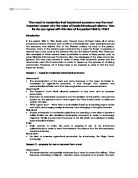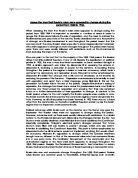Although Lenin also used repression, the similarity in personalities between Nicholas 2 and Stalin meant that both used similar methods. Both were intensely paranoid about the public’s perception that they were weak. To disprove this, both resorted to violent repressive tactics. Repression under Lenin was more calculated – he talked of the ‘coercion’ needed for the ‘transition from capitalism to communism’.
Both governments were autocratic and wished to impose extreme ideologies and therefore required total support which they believed was only achievable by quashing any opposition. Total control was to be achieved by the Tsar’s ‘divine right’ to have this and by the Bolshevik’s through their classless, one party state. This was shown when Lenin forcibly disbanded the constitution in 1918, because the Bolsheviks would not have had the majority vote they needed for the total control they sought. As a result Lenin became the leader of the only powerful party- the Communists. Later, Stalin increased his control through purges within his own government - ensuring his role as the absolute leader – reflecting the Tsar’s goal of omnipotence following the Fundamental Laws.
The Tsar required repression of the peasantry (80% of the population) whereas the Bolshevik’s faced opposition from the middle and upper classes. Tsarism relied heavily on religion (the Russian Orthodox Church/ROC) to control the people whereas the Bolsheviks saw this as a threat. The ROC taught that the Tsar was ‘God on earth’ in an attempt to indoctrinate the peasantry to such an extent that they would do as he commanded. Important ministers were often associated with the Church e.g. Pobiedonotstev. After the downfall of Tsarism, Lenin proclaimed the Marxist theory that religion was ‘the opium of the people’ and proceeded to turn repression onto the church to rid Russia of this perceived powerful opponent to the communist system. Stalin continued the destruction of religion in Russia through the assassination of any cleric he felt had too much influence.
The Tsar and the Bolsheviks both faced threatening opposition. The Tsar’s opponents ranged from the peasant-based Social Revolutionaries (who would later become the Bolsheviks opponents) to the Bolsheviks themselves – supported by the working class. The failure of the 1905 revolution after the intervention of the Okhrana and army showed that the Tsar could not have retained power without repression. The Okhrana were also used to rid Russia of revolutionaries – such as Lenin himself. The Bolsheviks shared the problems caused by the ethnic minorities and their wish for independence. However, The Treaty of Brest-Litovsk weakened this opposition for the Bolsheviks after it removed 25% of Russian land - mainly that housing the minorities. Both regimes faced a wide range of opposition, prompting repression to remove the greatest threats – such as the dissolution of the SR-dominated constitution in 1918. Lenin reduced the power of the elite by taking their property and institutions from them. Stalin continued and extended the use of repression - eliminating any minor threat, including members of the Communist Party in his ‘Great Purges’
Conflict encouraged the rulers during this period to resort to repression. The Tsar faced the Russo-Japanese war and the Great War during his reign. The Bolsheviks had to contend with a Civil War. In both cases, repression was used to evoke loyalty and force unification. The Cossacks and Ohkrana were fundamental to the suppression of objectors to the Tsar, as were the Bolshevik equivalents, the Cheka. The Cheka aided Bolshevik victory in the Civil War and were then used by Lenin to forcibly take grain for the soldiers under the Grain Requisition Act despite the distress caused to the peasants. The Tsar also used repression to keep Russia fighting in the Great War – including the silencing of anti-war parties and also opposition to the mandatory food rationing by a hungry people. Despite these efforts, war finally brought the downfall of Tsarism after mass desertion from the army effectively took away the last prop of the old regime. The Bolsheviks however, emerged successfully from the Civil War allowing them to consolidate their new-found power with the use of additional repression.
Retarded Industrialisation was a long-term problem that is still felt by Russia today. The Tsar attempted to improve Russia’s industrial affluence whilst maintaining control by repressing the working classes to prevent them revolting. To do this, he banned trade unions and imprisoned the leaders. The Communists also attempted to improve Russia’s industrial situation- through the conversion from capitalism to communism. The Tsar sought support from other European countries whereas the Communists violently rejected this policy. This meant that the Communists required a greater level of forced labour (i.e. repression) in order to cope without this aid. Stalin hoped to develop Russia into a ‘superpower’ in his 5-year plans. This involved the use of the forced free labour of non-conformists who were imprisoned in labour camps. The Kulaks (wealthy peasants) were among those sent to such a camp. ‘Collectivisation’ was a re-introduction of the Grain Requisition and an attempt to revolutionise agriculture along Communist lines and resulted in starvation of the rural population. This repression of the peasantry was also evident in the Tsarist regime to prevent unrest.
The long-term problems experienced by Russia at this time encouraged the use of repression as a means of control. The huge population spread over a vast land area meant that in addition to the communication problems caused by sheer size and the abundance of minority groups, it was impossible for any government to meet the demands made by all of the people. The Tsar attempted to deal with this through the enforcement of Russfication and sending the army to eliminate any protesters e.g. in Uzbekistan. The Bolsheviks also faced the minority opposition with violent repression - millions of Ukrainians were sent to forced labour camps by Stalin. Prejudice against ethnic groups was rife; anti-Semitism caused repression of Jews under both Tsarist and Bolshevic regimes.
Although it can be said that the governments of Nicholas 2, Stalin and to a lesser extent Lenin were repressive by nature, the need for control via repression was inherent within the set up of Russia. Until the fall of communism in Russia in the late 20th century, it was clearly evident that the more lenient governments, such as that of Alexander 2 and Provisional Government were less successful than the more repressive ones although they were hardly given chance to do well, so quick were some to take their place at the first sign of weakness. This acted as an encouragement for the major governments between 1900-1929 to use the secret police, army and threat of imprisonment to deter opposition, repress the peasantry and enforce the ideologies of the government. Repression was imperative for both governments; the Tsarist to cling to power and the Communists to snatch it from them. Both had many unpopular economic, political and social reforms to pass. War highlighted the problems of the country and the presence of strong opposition against both governments. In the view of both it increased the need for repression to realign the economic and social structure. Under both regimes the cause and the effect of repression was the same; it resulted in the death or displacement of many. Unfortunately, it was just a prelude to the terror that was to be experienced during the ‘High-Stalinism’ of the 1930’s. During this decade, 7 million died, mostly after being sent to a labour camp for failing to conform to the Communist ideal of ‘collectivisation’.








